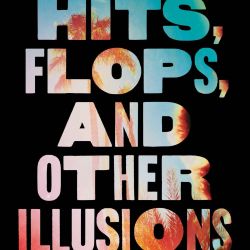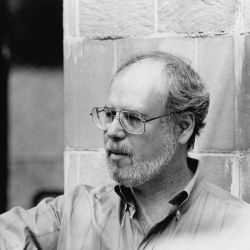Share

Writers on Film
Tony Bill Talks Movie Speak
“Movie Speak won’t guarantee you a job, but having a knowledge of the industry terms will fool everyone into thinking you own the place.” — Steven Spielberg
“Finally a book that celebrates the process—the dynamic web of people, technique, and artistry—underneath every foot of celluloid.” —Jodie Foster
Uncover the secret language of movie-making in a handbook for film buffs and language-lovers, as well as anyone who aspires to break into the business, with hundreds of essential terms, explained. Opening a window into the fascinatingly technical, odd, colorful, and mysterious working language of movies, Oscar-winning producer, actor, and director Tony Bill sheds light on the hugely complex process of making a film, as well as on the hierarchies between the cast and crew and the on-set etiquette of any movie production.
From why the Assistant Director calls “wrap” to the real reason Hollywood stars began wearing sunglasses, Movie Speak offers tricks of the trade learned over decades in Hollywood—to help you crack the code of the movie business.
More episodes
View all episodes

152. Ed Zwick on Hits, Flops, and Other Illusions
49:51A NEW YORK TIMES BESTSELLER * LOS ANGELES TIMES BESTSELLER * USA TODAY BESTSELLERThis heartfelt and wry career memoir from the director of Blood Diamond, The Last Samurai, Legends of the Fall, About Last Night, and Glory, creator of the show thirtysomething, and executive producer of My So-Called Life, gives a dishy, behind-the-scenes look at working with some of the biggest names in Hollywood.“I’ll be dropping a few names,” Ed Zwick confesses in the introduction to his book. “Over the years I have worked with self-proclaimed masters-of-the-universe, unheralded geniuses, hacks, sociopaths, savants, and saints.”He has encountered these Hollywood types during four decades of directing, producing, and writing projects that have collectively received eighteen Academy Award nominations (seven wins) and sixty-seven Emmy nominations (twenty-two wins). Though there are many factors behind such success, including luck and the contributions of his creative partner Marshall Herskovitz, he’s known to have a special talent for bringing out the best in the people he’s worked with, especially the actors. In those intense collaborations, he’s sought to discover the small pieces of connective tissue, vulnerability, and fellowship that can help an actor realize their character in full.Talents whom he spotted early include Brad Pitt, Matt Damon, Denzel Washington, Claire Danes, and Jared Leto. Established stars he worked closely with include Leonardo DiCaprio, Anthony Hopkins, Tom Cruise, Julia Roberts, Anne Hathaway, Daniel Craig, Jake Gyllenhaal, Bruce Willis, Demi Moore, and Jennifer Connelly. He also sued Harvey Weinstein over the production of Shakespeare in Love—and won. He shares personal stories about all these people, and more.Written mostly with love, sometimes with rue, this memoir is also a meditation on working, sprinkled throughout with tips for anyone who has ever imagined writing, directing, or producing for the screen. Fans with an appreciation for the beautiful mysteries—as well as the unsightly, often comic truths—of crafting film and television won’t want to miss it.
151. Robert P Kolker and Marsha Gordon talk Film, Form and Culture
57:17This fifth edition of Film, Form, and Culture by Robert P Kolker and Marsha Gordon offers a lively introduction to both the formal and cultural aspects of film.Additional resources for students and teachers can be found on the eResource, which includes case studies, discussion questions, and links to useful websites.Get the book HERE.
150. Neil Alcock talks Hitchcock and Hitchology
50:45MURDER! MOTHERS! MEN ON THE RUN!Film fans know these are just a few key ingredients of Alfred Hitchcock’s movies. When Hitchcock fused these elements with his innovative directorial approach, that blend of familiar themes and stylistic ingenuity became known as ‘Hitchcockian’. In a refreshingly original way, HITCHOLOGY considers how Hitchcock used these narrative tropes and formal flourishes to create some of cinema’s most unforgettable experiences.Alongside unique takes on every film and TV episode Hitchcock directed, HITCHOLOGY also examines his collaborators, his cameos, other films in the Hitchcock cinematic universe, and more. Passionately written with wit and warmth, HITCHOLOGY is an accessible introduction for newcomers to Hitchcock, and an insightful companion for devoted fans.Buy the book HERE.
149. Oscar Winning Screenwriter Bruce Rubin talks about his Life
01:06:48Bruce Joel Rubin is the Oscar winning screenwriter of Brainstorm, Ghost and Jacob's Ladder among others. His memoir It's Only a Movie is availbale here. And his book Three Visionary Screenplays is also available via this link.
148. Christian Esquevin talks Designing Hollywood
46:59Since the 1920s, fashion has played a central role in Hollywood. As the movie-going population consisted largely of women, studios made a concerted effort to attract a female audience by foregrounding fashion. Magazines featured actresses like Jean Harlow and Joan Crawford bedecked in luxurious gowns, selling their glamour as enthusiastically as the film itself. Whereas actors and actresses previously wore their own clothing, major studios hired costume designers and wardrobe staff to fabricate bespoke costumes for their film stars. Designers from a variety of backgrounds, including haute couture and art design, were offered long-term contracts to work on multiple movies. Though their work typically went uncredited, they were charged with creating an image for each star that would help define an actor both on- and off-screen. The practice of working long-term with a single studio disappeared when the studio system began unraveling in the 1950s. By the 1970s, studios had disbanded their wardrobe departments and auctioned off their costumes and props. In Designing Hollywood: Studio Wardrobe in the Golden Age, Christian Esquevin showcases the designers who dressed Hollywood's stars from the late 1910s through the 1960s and the unique symbiosis they developed with their studios in creating iconic looks. Studio by studio, Esquevin details the careers of designers like Vera West, who worked on Universal productions such as Phantom of the Opera (1925), Dracula (1931), and Bride of Frankenstein (1931); William Travilla, the talent behind Marilyn Monroe's dresses in Gentleman Prefer Blondes (1953) and The Seven Year Itch (1955); and Walter Plunkett, the Oscar-winning designer for film classics like Gone with the Wind (1939) and An American in Paris (1951). Featuring black and white photographs of leading ladies in their iconic looks as well as captivating original color sketches, Designing Hollywood takes the reader on a journey from drawing board to silver screen.
147. Tom Shone on the Oscars and Dune Part 2
01:21:13Tom Shone is the bestselling author of The Nolan Variations, among several other books on cinema.
146. Stephen Lee Naish on Dennis Hopper, film director
01:03:35Stephen's book is availble here. Across his directorial films, American filmmaker Dennis Hopper used music and sound to propel the narrative, signpost the era in which the films were made, and delineate the characters’ place within American culture. This book explores five of Hopper’s films to show how this deep engagement with music to build character and setting continued throughout his career, as Hopper used folk, punk, hip-hop, and jazz to shape the worlds of his films in ways that influenced other filmmakers and foreshadowed the advent of the music video format.The author traces Hopper’s distinctive approach to the use of music through films from 1969 to 1990, including his innovative use of popular rock, pop, and folk in Easy Rider, his blending of diegetic performances of folk and Peruvian indigenous music in The Last Movie, his use of punk rock in Out of the Blue, incorporation of hip-hop and rap in Colors, and commissioning of a jazz/blues soundtrack by Miles Davis and John Lee Hooker for The Hot Spot. Uncovering the film soundtrack as a vital piece of the narrative, this concise and accessible book offers insights for academic readers in music and film studies, as well as all those interested in Hopper’s work.
145. Kubrick: an Odyssey
01:04:31The definitive biography of the creator of 2001: A Space Odyssey, The Shining, and A Clockwork Orange, presenting the most in-depth portrait yet of the groundbreaking film-maker.The enigmatic and elusive filmmaker Stanley Kubrick has not been treated to a full-length biography in over twenty years.Stanley Kubrick: An Odyssey fills that gap. This definitive book is based on access to the latest research, especially Kubrick's archive at the University of the Arts, London, as well as other private papers plus new interviews with family members and those who worked with him. It offers comprehensive and in-depth coverage of Kubrick’s personal, private, public, and working life. Stanley Kubrick: An Odyssey investigates not only the making of Kubrick's films, but also about those he wanted (but failed) to make like Burning Secret, Napoleon, Aryan Papers, and A.I.Revealingly, this immersive biography will puncture the controversial myths about the reclusive filmmaker who created some of the most important works of art of the twentieth century.
144. Ellen E. Jones on Screen Deep
01:06:42Screen Deep:How film and TV can solve racism and save the world is a book about the immense potential of screen storytelling to defeat an evil both historic and urgently topical: racism. Everyone watches TV and movies. Everyone has an interest in building a more just and equitable world. Screen Deep goes beyond the many film books and anti-racist manuals by demonstrating the connection between these two aspects of modern life.In Screen Deep Ellen E. Jones combines her personal experience as a mixed-race woman who cares about racism with her professional expertise as a film and TV journalist of twenty years standing, to ask – and answer – several questions: Is there such a thing as an Indigenous western? Is race comedy ‘cancelled’? Where are all the films for white people? And most importantly: Can you still fight the good fight with a mouthful of popcorn?The book is available from Faber here. Valerie Complex's Deadline article mentioned on the show is available here.